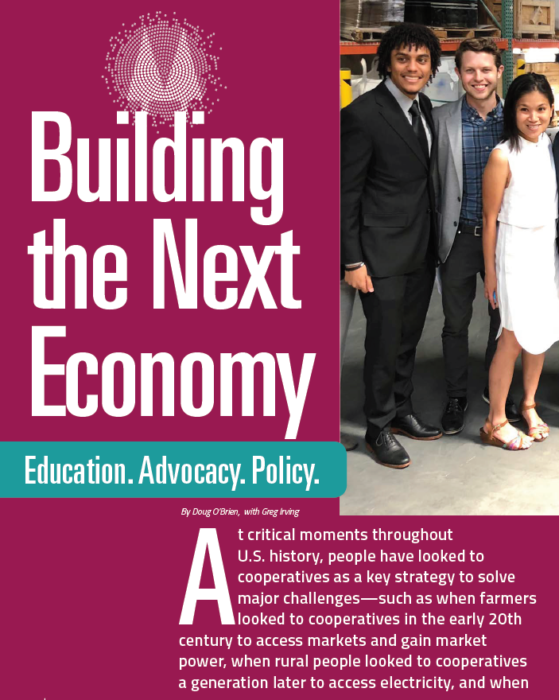
Fall 2019 – The Next Economy
Building the Next Economy
Education. Advocacy. Policy.
By Doug O’Brien, with Greg Irving
At critical moments throughout U.S. history, people have looked to cooperatives as a key strategy to solve major challenges — such as when farmers looked to cooperatives in the early 20th century to access markets and gain market power, when rural people looked to cooperatives a generation later to access electricity, and when millions of people looked to credit unions to gain control of their financial future. These solutions occurred only when policymakers created laws and regulations that supported the model. And these policymakers created this policy only when people in the cooperative community educated and persuaded policymakers on the power of the cooperative business model.
Today’s environment represents another “cooperative moment.” As policymakers seek answers to today’s greatest challenges, the cooperative business model poses proven solutions. And just as in the past, the most effective way for policymakers to grasp the cooperative potential is for the cooperative community to be active in educating and advocating for better cooperative policy.
Recently NCBA CLUSA wrote an open letter addressed to the 2020 presidential candidates from both major parties, urging them to consider how cooperatives can be a vital component of their policy platforms.1 The letter made the point that as candidates seek solutions to some of today’s most critical challenges, they should look to cooperatives as a strategy with a record of empowering people in their businesses and communities.
A cooperative’s members drive its success and a supportive policy environment accelerates cooperative development and growth. Robust, co-op friendly policies raise the likelihood that co-ops can thrive and enable them to solve problems that we as a nation face today. People in the U.S. are eager for a renewed debate about the issues that matter to them most and for an opportunity to participate in their democracy. We are in a critical moment. While multiple economic indicators are strong and unemployment is low, many Americans are still excluded from the economy as a result of growing inequality, the changing nature of work and the increasing usage of new and disruptive technology.
“Increasing employee ownership will help support a strong economy and promote job security in communities across the state” – Gov. Jared Polis
Cooperatives must be part of any effective plan or platform that addresses these challenges.
Cooperatives are a proven policy strategy. They deliver results. Co-ops have reduced poverty, improved food security, supplied rural electrification and provided affordable financial services where none existed. Cooperatives are a more stable form of business than their competitors, making their benefits likelier to endure.2 Because they exist to serve members that tend to live locally, they are more likely to lead efforts to create more sustainable local economies. This makes it easier for members of cooperatives and, indirectly, their communities to attain economic security that extends to a greater swath of the population.
These facts demonstrate that co-ops should be an integral component of every policymaker’s platform. One reason co-ops are not as prominent in community economic development policy is a lack of understanding of cooperatives by the broader public. Another is that policymakers do not realize how often cooperatives are successfully employed to solve problems. Co-ops could benefit our communities more if policymakers were better informed about current policy examples involving co-ops. The best method for educating policymakers has always been the advocacy work of the co-op community. We should develop a sharp curiosity for the work of our fellow cooperators, finding inspiration and strategies to advance our own efforts. To that end, this article amplifies some recent examples of policymaking that are creating a better policy environment for cooperatives.

Federal policymaking and cooperatives
In recent years, there have been encouraging signs that federal policymakers are taking a keener interest in cooperatives. Particularly, many in Congress have recently recognized the vital importance of cooperatives. Several Democratic and Republican lawmakers, including some 2020 presidential hopefuls, have proposed legislation to promote the increased utilization of cooperatives in areas such as worker co-op conversions, childcare, homecare, internet access, food and housing.3,4 Further, both the House and Senate have maintained funding support for Rural Cooperative Development Grants program (RCDG) even though the Administration’s budget continues to propose the elimination of this vital program. In the Senate, eight senators wrote a letter to the Senate Appropriations Committee urging them to increase RCDG funding to by nearly 30 percent.5 (Continued advocacy on this critical issue will be important as the Senate and the House negotiate final spending levels.)
After stagnant funding for more than five years, increasing RCDG only makes sense. Over the next decade, baby boomers will retire in growing numbers. Roughly 10,000 boomers will turn 65 each day of every year through 2030.6 Many own successful businesses — often the hearts of the communities they serve — but have neither plans nor a clear buyer to preserve their business after they retire. Co-op conversions facilitate the buying of businesses by the workers or consumers who know the business well. Last year’s passage of the bipartisan Main Street Employee Ownership Act is further evidence that policymakers in Congress are recognizing coops’ importance and potential. The law requires equal access for cooperatives and Employee Stock Ownership Plans (ESOPs) to Small Business Administration (SBA) technical assistance and loan programs. Food co-ops and worker co-ops stand to expand and grow as a direct result. Like the RCDG program, Congressional policymakers view Main Street as an opportunity to use co-op conversions to save viable, healthy businesses from closing when their owners retire.7 Because SBA’s report to Congress did not fully address the challenge that coops face accessing SBA’s products, advocacy will be a key factor in ensuring that the SBA properly fulfills Congress’ clear mandate to support cooperatives.
Federal policymaking has tapped cooperatives to improve energy efficiency and lessen the financial burden for lower income homeowners in rural areas. Created in the 2014 Farm Bill, the Rural Energy Savings Program (RESP) provides rural electric cooperatives and other rural utilities with zero-interest loans.8 Co-ops use these to start or expand energy efficient financing programs for their members. Members and co-ops can apply to replace outdated HVAC units, install energy-storage devices, build envelope upgrades and even replace manufactured homes with more energy efficient dwellings. The average investment is $7,500 — a price otherwise out of reach for many residents. The loans are repaid through the utility bill with no upfront costs to the co-op members.

Both increasing energy efficiency and “beneficial electrification” — the replacement of equipment that directly burns fossil fuels with those that use electricity — reduce the demand for energy sources that emit carbon dioxide. RESP tightly links climate change mitigation with improved energy affordability in rural areas, an important component of reducing inequality. Rural households tend to pay more for energy — about 40 percent more on average when compared to urban households — while also generally earning less money.9 Cooperatives naturally see in RESP a program that helps their member-owners access 21st century energy technology. When one member saves because of an energy efficient investment, every member benefits from lower overall costs.
These encouraging signs of rising federal recognition and action build on long-running efforts to boost the profile and benefits of cooperatives. The return of a question asking businesses whether they identify as cooperatives to the 2017 Economic Census — after a decades-long absence — has opened new and exciting possibilities for expanded research on cooperative businesses.10 The data from this census will let researchers obtain a more accurate count of the number of cooperatives in the U.S., glean new insights into the state of cooperatives compared to other forms of businesses, and create an overall better picture of where co-ops stand in the economy.11 Data will be released over a period lasting several years, with a first look at economy-wide business statistics scheduled for Fall 2019 and further releases running until at least September 2021.12 Cooperatives additionally now have expanded opportunities to make effective use of this data thanks to new provisions in the Farm Bill’s re-authorization of the RCDG program. There are now authorized, set-aside funds specifically for research into the data.13
A supportive policy environment accelerates cooperative development and growth.
While we look forward to the benefits of this research, we should note that it will ultimately have come in large part through the Interagency Working Group on Cooperative Development (IAWGCD).14 The working group was created through successful advocacy by the cooperative community. This culminated in authorization by the 2014 Farm Bill. Headed by the USDA, the working group promotes a whole-of-government approach to using cooperative enterprise to solve specific public policy challenges. With more than a dozen government agencies as members, this group ensures the government is on the same page in its engagement with cooperative businesses. The group is critical in bringing key stakeholders and policymakers together to consider how federal agencies can better support cooperatives.
State and municipal policy initiatives
Not to be outdone by their federal counterparts, state and municipal policymakers are harnessing co-ops to solve the needs of their communities. One important example is the growing recognition by states that access to swift, reliable broadband is crucial for continued economic development and growth in the 21st century. According to the Federal Communications Commission, approximately 34 million Americans currently lack access to high-speed internet.15 Most of them live in rural areas and are usually served by rural electric co-ops.16
State legislators know this, often because they are themselves members of cooperatives. Accordingly, many legislatures have established policies to expand opportunities for cooperatives to serve their members’ broadband needs. In January 2018, the Missouri legislature voted to lift a state ban that prevented electric cooperatives from supplying broadband. During 2017 and 2018 Georgia, Alabama, Illinois, Nebraska and Tennessee each passed legislation that empowers co-ops to increase broadband access for their members, too.17 These were part of a larger push for rural broadband legislation across the country. Since January 2018, more than 29 bills in 14 states were introduced that promoted rural broadband.18 At least 26 such bills have been enacted.19 At least six of these mentioned or explicitly required cooperative involvement either in state grant programs or task forces to address broadband access. Most of the remaining bills concentrated on funding general research programs or target specific types of broadband provision, such as at public libraries in rural areas. As such, broadband-interested co-ops will generally be able to access available funding and benefit from such legislation.
Some states are focusing on creating a more welcoming environment for co-ops by updating the statutes that govern cooperative formation and governance. This year, the Connecticut General Assembly passed “Proposed Bill No. 138: An Act Modernizing the State’s Cooperative Association Statutes.”20 The legislation will make it easier to form and expand cooperatives, including by converting existing businesses into co-ops. This marks a welcome departure from Connecticut’s earlier laws, which had the cumulative effect of impeding cooperative development in that state.21 Cooperatives, including members of the Neighboring Food Co-op Association, were a major driving force behind getting these needed changes enacted. Meanwhile the Maine State Legislature has also advanced “An Act to Create and Sustain Jobs through Development of Cooperatives and Employee-owned Businesses” to its appropriations committees. This follows efforts from the Cooperative Maine Alliance, Cooperative Development Institute and numerous others.22,23

Governors also see the benefits of welcoming and supporting cooperatives and employee ownership. This past April, Colorado Governor Jared Polis used an executive order to establish a commission that will research and support employee-owned businesses — particularly cooperatives — as a means to ensure small businesses remain in operation after the retirement of their current owners.24 Out of a state population of roughly 5.7 million, more than 1 million Coloradans are employed by small businesses.25 “Increasing employee ownership will help support a strong economy and promote job security in communities across the state,” Polis said a press release announcing the commission. “Supporting employee ownership has been a top goal and now we are taking the necessary steps to make it a reality.”
States are innovating with cooperative-based solutions that can go to scale nationwide. The Pennsylvania Fresh Food Financing Initiative (FFFI) was established in 2004 by the Pennsylvania state legislature, which provided $30 million in seed money.26 The Reinvestment Fund, a Community Development Financial Institution (CDFI) with a history of supporting co-op development, leveraged crucial additional funds amounting to a $120 million total program budget. The program ran for six years (2004-2010) until all funds were deployed. Food co-ops accounted for many of the 88 successful applicants for FFFI assistance.27 The program succeeding in supplying more than 400,000 residents with increased access to healthy food, retaining roughly 5,000 jobs and adding at least $540,000 in tax revenue.28
By living out Cooperative Principle #6 — cooperation among cooperatives — we build the strength and resilience of our businesses against unfair political efforts that would disadvantage cooperatives.
These state polices can go to scale nationally. In 2010, the Obama Administration created the Healthy Food Financing Initiative (HFFI), motivated partly by the successes of Pennsylvania’s program to increase healthy food provision. Members of Congress took note of the program’s early successes and made it part of the 2014 Farm Bill,29 thereby mandating public-private partnership between USDA Rural Development and CDFIs. The Healthy Food Financing Initiative supplies technical assistance and funding “to eligible healthy food retail projects to overcome the higher costs and initial barriers to entry in underserved areas.” These take the form of one-time grants. The program has provided funding to several cooperatives, cooperative development organizations and other organizations that used funds to support cooperatives. These include the Cooperative Fund of New England, the Lowcountry Housing Trust, Capital Impact Partners and ASI Federal Credit Union, among others.30 Since 2011 the program has leveraged over $1 billion in funds through its public-private partnerships. These funds have supported more than 200 projects in over 30 states and helped create or retain over 3,000 jobs.31
Like states, city governments have been supporting cooperatives to achieve their policy goals. The city council of Berkeley, California recently allocated $100,000 for worker co-op development over the next two years.32 This came about after the city’s Office of Economic Development commissioned a study of area businesses—conducted by Project Equity, an organization that promotes co-ops — “as an exit strategy for business owners, and as an important approach for increasing employee engagement and wellbeing.”33 It found that 1,200 local businesses would require succession planning over the coming 15 years as business owners retire. These businesses total $1.6 billion in annual sales revenue and provide a third of local jobs. The allocated funds will be used to expand an existing worker co-op pilot program. The program supports conversion to worker cooperatives as a means of securing these jobs against possible loss due to owner retirements.
Elsewhere local political candidates recognize that cooperatives are vital to local growth and a winning component of their electoral platforms. As just one example, Satya Rhodes-Conway — current mayor of Madison, Wisconsin — was elected to office on a platform that featured cooperatives prominently. Rhodes-Conway proposed using housing co-ops to improve access to affordable housing.34,35 Her proposals reflect research from Madison’s own University of Wisconsin Center for Cooperatives, which has analyzed the ways co-ops can increase affordable housing and done significant research on housing co-ops in Madison and nearby areas.36
Just as a cooperative thrives when members are engaged in its success, our attempts to build a better policy environment for co-ops will succeed only if we participate in the policymaking process.
The need for co-op community advocacy
While more policymakers see the wisdom of supporting the cooperative business model, the cooperative movement will build strength and sustain itself only through the actions and advocacy of the cooperative community. Federal advocacy efforts often get attention, but we should also keep keen eyes on local and state-level policymaking. Events earlier this year in the Iowa Legislature can demonstrate why. Lobbyings by certain banking organizations sought to increase taxes and impose membership restrictions on credit unions and their member-owners.37 This is part of an ongoing, multi-year effort to reduce the community-enhancing work of credit unions in order to bolster the positions and profits of banks. The Iowa Credit Union League’s monitoring and engagement with the Iowa credit union community and the larger co-op community have been vital to the continued defense of credit unions and their members.38 The League’s efforts should remind us that there are cooperative members in virtually every state or federal legislative district whom we can call on for support. By living out Cooperative Principle #6 — cooperation among cooperators — we build the strength and resilience of our businesses against unfair political efforts that would disadvantage cooperatives.
The examples in this piece have primarily concerned policymakers’ focus on cooperatives. This work is united by the fact that it succeeds only through the participation and efforts of active members of the co-op community. To become better advocates, we need to be in dialogue with one another, learning about the cross-sector issues our movement is facing and leveraging resources and ideas to promote cooperative solutions to pressing issues.
The Cooperative Development Foundation and NCBA CLUSA have created one such opportunity this year: the “Power in Purpose” Cooperative Policy Roundtable Series.39 These roundtables followed on our work with the Urban Institute to develop metrics to assess cooperative social and economic impacts on their communities, culminating in a report called “The ABCs of Cooperative Impact.”40 These regional cooperative policy roundtables have been designed to consider policies that could empower people to use cooperatives to build more inclusive local economies. The conversations are part of ongoing research funded by the Robert Wood Johnson Foundation to research the social and economic impact of cooperatives — part of the philanthropy’s longtime focus on healthy communities. Events have been held in Harrisburg, Pennsylvania; Denver, Colorado; Billings, Montana; Madison, Wisconsin; and Maple Grove, Minnesota. Upcoming events are also scheduled for Olympia, Washington and Sacramento, California with further locations to be determined.41
Cooperative solutions have immense promise for solving today’s issues. As we look ahead to the 2019 and 2020 election cycles, we should work to ensure our elected officials know more about cooperatives.42 They need to see the long-term benefits and potential of our business model. Cooperatives have the power to improve people’s lives for the better beyond the next election cycles. Their strength comes from their members, who own their businesses and seek to ensure that they remain stable and sustainable parts of their local communities.
In urging policymakers to utilize the cooperative business model, let’s consider some of the growing challenges where cooperatives should be an essential part of the solution, including:
- Homecare for seniors: In an industry plagued by an 82 percent turnover rate nationally, employee-owned homecare improves quality of care and reduces annual turnover to 30 percent.
- Rural broadband and connectivity: Nearly 100 electric co-ops (and counting) now provide reliable, high-speed internet to rural consumers whom investor-owned internet providers fail to serve.
- Financial products: Credit unions serve consumers of all backgrounds and provide credit and banking services to traditionally under-banked communities.
- Clean energy: Consumers should be at the heart of the burgeoning clean energy sector.
- Stable and affordable housing: Housing cooperatives are a lower-lending risk, with lower monthly costs to residents and higher housing satisfaction by owner-tenants.
- Food: Food cooperatives provide access to nutritious, affordable food.
- Platform cooperatives: People who work in the fast-growing gig economy should have the ability to participate more fully in their businesses through the cooperative business model.
- Information technology and big data: Consumers should reap more of the value created by their data through cooperative ownership.
- Childcare: More childcare providers could own use this solution that has proven successful in the more than 500 existing childcare cooperatives.
To empower more people to use cooperatives, policymakers should:
- Increase access to capital for cooperatives to startup, expand or innovate;
- Support innovative strategies to deliver technical assistance;
- Encourage broader interagency coordination at the federal and state levels; and
- Increase investment in research and development of cooperative businesses.
By working together, we can show policymakers what cooperatives can do to improve the lives of every American. Through our advocacy efforts, we can build a stronger, more inclusive economy. Just as a cooperative business thrives when members are engaged in its success, our attempts to build a better policy environment for cooperatives will succeed only if we actively participate in the policymaking process.
Doug O’Brien is President and CEO of NCBA CLUSA, where he works with the cooperative community, both domestically and internationally, to deepen its impact on the economy. Doug has been with NCBA CLUSA since 2016, when he joined the association as Executive Vice President of Programs. Previously, he led the work of the White House Rural Council and served in top positions at the U.S. Department of Agriculture’s Rural Development. Greg Irving is a Research Assistant at NCBA CLUSA.






